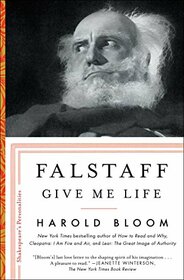First, Simon Vance does a brilliant job with his interpretations of Shakespeare's plays. Simon Vance has been one of my favorite readers for years, but in this book, he interprets Shakespeare's lines beautifully. Harold Bloom was a highly-regarded professor, who offered insightful analysis on anything that caught his attention. Bloom retired from teaching graduate students at Yale; and wrote wonderful insights for all of us. He died in 2019. In 2017, Harold Bloom was recognized as "probably the most famous literary critic in the English-speaking world."
This is the first of Bloom's five Shakespeare's Personalities books Falstaff: Give Me Life. The other four are: Cleopatra, Hamlet, Iago, and Lear.
Falstaff is a tragi-comedic protagonist in three of Shakespeare's Henry plays: Henry IV; Henry IV, Part One and Henry IV, Part Two; and Henry V. Bloom examines the relationship between Falstaff and Prince Hal (who will become Henry V). Because of the complexity of Falstaff's personality traits, people have been dissecting Falstaff for generations. Bloom's evaluation matured as he aged and that gives readers an opportunity to see how literature changes us (as we age).
I find Harold Bloom to be a different type of literary critic. To me, Bloom is a "kitchen sink" type of author; he tosses in long quotes of Shakespeare to prove his points. With an encyclopedic knowledge of other literary critics' analyses, he tosses those in, for good measure. It certainly makes for a heady brew.
In 400+ years, what is funny has changed. However, Bloom takes readers by the hand and reeducated us to see the (at times) wildly humorous repartee between Falstaff and Hal. Bloom makes readers of his books work; he doesn't just pour analysis over our heads, he makes us think about it and come to our own conclusions. Perhaps that is what made Bloom such a great literary critic.
This is the first of Bloom's five Shakespeare's Personalities books Falstaff: Give Me Life. The other four are: Cleopatra, Hamlet, Iago, and Lear.
Falstaff is a tragi-comedic protagonist in three of Shakespeare's Henry plays: Henry IV; Henry IV, Part One and Henry IV, Part Two; and Henry V. Bloom examines the relationship between Falstaff and Prince Hal (who will become Henry V). Because of the complexity of Falstaff's personality traits, people have been dissecting Falstaff for generations. Bloom's evaluation matured as he aged and that gives readers an opportunity to see how literature changes us (as we age).
I find Harold Bloom to be a different type of literary critic. To me, Bloom is a "kitchen sink" type of author; he tosses in long quotes of Shakespeare to prove his points. With an encyclopedic knowledge of other literary critics' analyses, he tosses those in, for good measure. It certainly makes for a heady brew.
In 400+ years, what is funny has changed. However, Bloom takes readers by the hand and reeducated us to see the (at times) wildly humorous repartee between Falstaff and Hal. Bloom makes readers of his books work; he doesn't just pour analysis over our heads, he makes us think about it and come to our own conclusions. Perhaps that is what made Bloom such a great literary critic.




